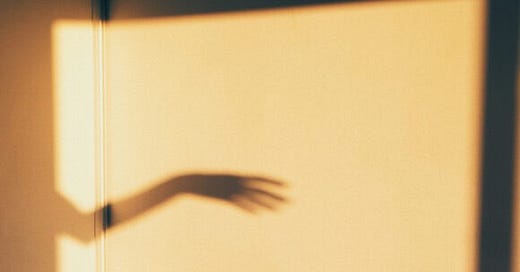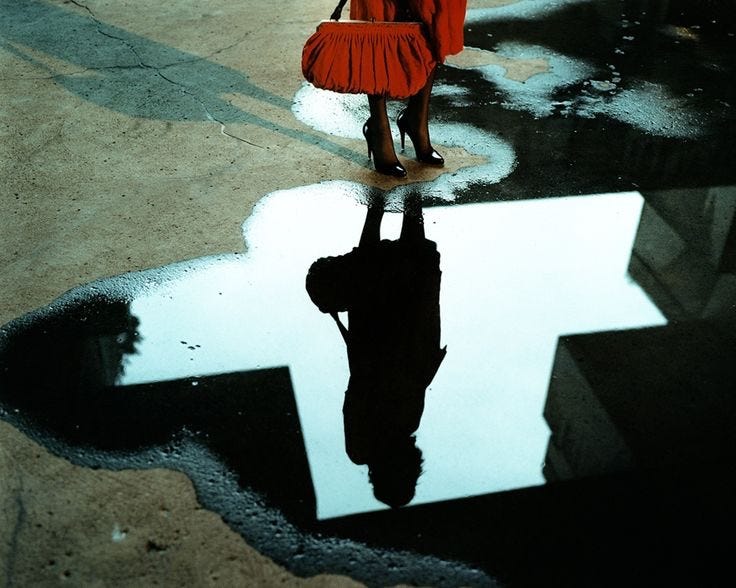what makes something authentically you? my mind jumps to stories of how i do this or that or because i have this background or dream of this…blah blah blah. the crux of thought is taking oneself too seriously. when we can think without attaching ourselves to the meaning, we enter emergent territory.
experiencing the world and letting it refract through your lens without a need to change it, or defend it, or explain it.
it is that extra action that removes authenticity from one’s point-of-view. it is that second thought that adds the filter of societal norms to the artwork. for some, that’s okay. in fact, that’s the whole point — to extrapolate, constructing a narrative that expresses the artist’s intention.
authenticity is a spectrum based on our manipulation of essence itself. to let sunlight beam through the window, we see a specific shape on the ground. the filter of the lens of which is the most primitive stamp of one’s perspective. now, if we play with the shape, making shadow puppets…then the shape is no longer the shape itself, but a bunny! or a swan! whichever puppet tickles your fancy. maybe you want to add more, creating a diorama around the shadow to create a scene, or extra lighting to create dimension.
there is nothing “good” or “bad”. it’s just a matter of preference. what speaks to you?
do you prefer a highly raw, less filtered orientation to your work? or a piece of it? highly authentic, “in a way that faithfully resembles the original”, as the Oxford dictionary puts it.
or, do you prefer a highly stylized, more filtered orientation? maybe a curated view.
one’s definition also varies based on what is considered “the original”. i prefer to define the original as inspiration itself, as the creative spirit that seeps into my consciousness and tells me what to pay attention to, or what to create. that is what i deem “essence”, and i prefer to follow my own sense rather than adapt another’s.
all is art. but again, what do you prefer?
“Your brain is like your fingerprint […]
One of the reasons that people can read your books and dig them is because — you know they’re 99.99% the same — but then whatever that fraction of a percent, it’s unique to you.
So the world description refraction goes through your brain in a way and refracts into the world as a novel, or as a poem, or as a short story, as a song, whatever, in a way that if you’re really paying attention and you slow down, and you really let the world, you know, take the time to let what the real words are that are going, that you really get as experience, goes through your brain and you bring it back out into the world as prose. […]That’s one of those things where you go, ‘Oh my god, how did you write like Faulkner?’ You know, you never open a page of Faulkner and go, ‘Oh, is that Anne Batty?’ right? And that’s because Faulkner was letting it go through him and then he had to put it into the world in a certain way.”
—Paul Harding1
when Andy Warhol was asked why he painted soup cans, he answered, “I just do it because I like it,” or “I like soup”.2
there doesn’t need to be more than that.
when Erykah Badu was asked how she decides what to make, she answered, “I make what I like and they eat it how they want to eat it.”3
making art is easily tangled with creating narratives, added complexity, posturing to what the public would understand, and mastery.
however, the artists with long, joyous careers stay true to what is their lens of the world and honor it without need to satisfy others. whatever that renders, a way to measure it is, “do i like it?” if the answer is no, then keep tinkering until you do. building intuition on when to step forward and when to consider it done is based on a feeling, an intuition that gets sharper over time.
authenticity is staying true to your lens.
Writer Paul Harding won the Pulitzer Prize for Fiction for his first novel Tinkers which he spent nearly 10 years writing. Quote came from his interview with writer David Perell.
Pulled from Robert Green’s book The Art of Seduction.
Pulled from a WSJ Style interview with Donald Glover who was describing the best advice he was given.





